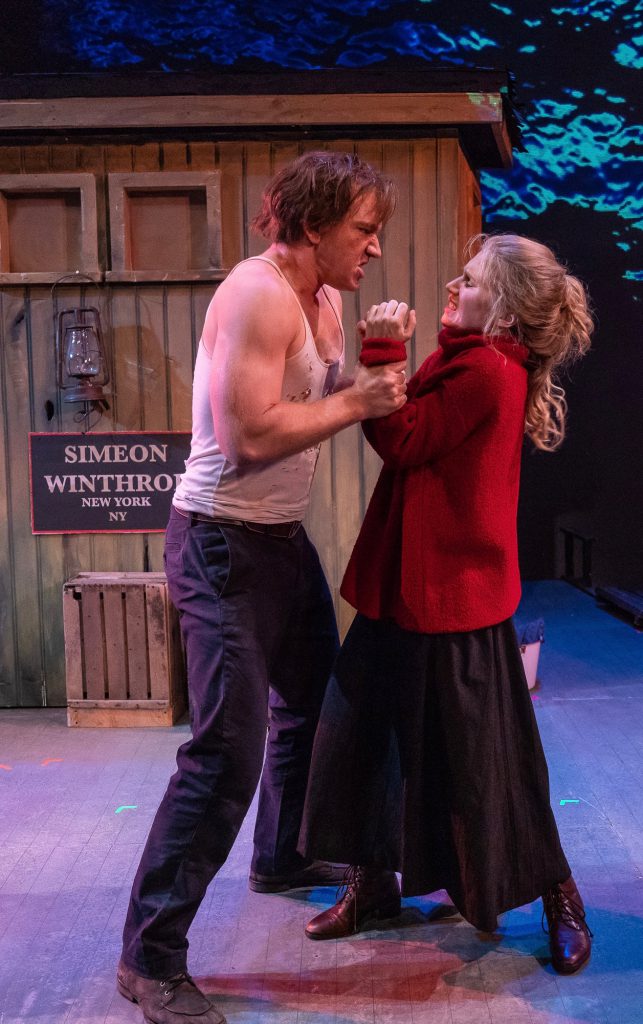Operatic treatment of O’Neill’s “Anna Christie” makes a long, confused journey into night

Melanie Long and Jonathan Estabrooks in Edward Thomas’s “Anna Christie” at Encompass New Opera Theatre. Photo: Steven Pisano
Eugene O’Neill’s Anna Christie has quite a pedigree as a dramatic work: the play won the 1922 Pulitzer Prize for Drama, and its 1930 screen adaptation featured the celebrated talkie debut of Greta Garbo. The story of a young woman trying to move beyond her troubled past by reconnecting with her father, is, like much of O’Neill’s oeuvre, a brooding work of static intensity.
Unfortunately, the operatic treatment premiered by Encompass New Opera Theatre this week, with music by Edward Thomas and a libretto by the late Joseph Masteroff, was a frustrating experience, feeling listless and confused in its performance Friday night at the Baruch Performing Arts Center.
This isn’t Thomas & Masteroff’s first crack at O’Neill: they collaborated previously on an operatic adaptation of Desire Under the Elms. Masteroff himself was an old hand in theater, having written the books for Cabaret and She Loves Me.
Their realization of Anna Christie has a severe pacing problem, much of which is the fault of the libretto: where it doesn’t drag, it leaves no room for the text to breathe, never stopping to let the audience catch up. Anna’s discovery, less than two minutes after being viciously attacked by Matt, that she finds him oddly charming anyway, is only the most glaring example.
Thomas’s music holds a lot of interest: airy harmonies, punchy rhythms, strong musical identities for the characters. But sonority and ease of melody= are the primary characteristics of his work, and, however pleasing to hear, they don’t produce the necessary feeling of disquiet. On a basic level, the work suffers because it loses the uncomfortable silences that are integral to the experience of O’Neill’s drama and fails to replace that tension with something else.
Melanie Long made the most of the title role, showing a caramel-colored mezzo-soprano of middling weight. Her interactions with the rest of the cast hinted at strong dramatic talent, but she didn’t have much of a chance to explore her character deeply, having to shuttle along from one overly fast scene to the next.
Jonathan Estabrooks brought a sinewy baritone to the role of Matt. His burly, rough, portrayal of a hot-tempered young sailor was convincing, but gliding right past the violence of his first interaction with Anna made it impossible later on for an observer to buy into their relationship.
The standout in the cast was Frank Basile as Anna’s father, the old barge-captain Chris Christopherson, singing with a firm bass-baritone with a warm haze on it. Of all of the cast, he was the most fascinating to watch, hinting at a rich inner life even on the periphery of a scene. This was a moving portrayal of a weary man utterly devoted to his daughter and doing everything he can to mend the past with her.
Joy Hermalyn brought a brassy mezzo-soprano and prickly bearing as Marthy, a colorful old regular at Chris’s favorite dingy pub. Mike Pirozzi was affable in the speaking role of Larry, the bartender.
It was a real coup for Encompass to get Julian Wachner, the impressive music director of Trinity Wall Street’s musical programs, to conduct. He managed to get a tight performance out of a not-very-polished chamber orchestra, and found rich color in a score mostly driven by light melodies.
Anna Christie runs through October 21 at Baruch Performing Arts Center. encompasstheatre.org
Posted Oct 08, 2018 at 9:39 am by ROGER JEFF CUNNINGHAM
Sometimes a review is judged more by what is NOT said than by what is said. In failing to list the Artistic Director and the Director of ANNA CHRISTIE, Nancy Rhodes, leaves this review wanting.
For over 40 years Ms Rhodes has championed the American Composer from Virgil Thomson, Aaron Copland, through developing composers such as Adam Guettel and Rickie Ian Gordon, to old hats like Charles Strouse, Sheldon Harnick and yes, even, Edward Thomas on his 94th Birthday.
This reviewer, in what was NOT said, shows his lack of research and understanding of the contemporary music scene and fails to respect the amount of tireless work that goes into the production of an opera beyond getting a couple of singers onstage to “plant and squawk!”